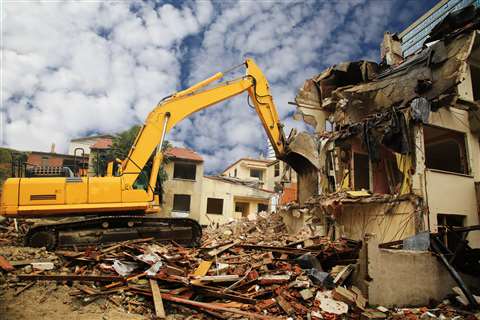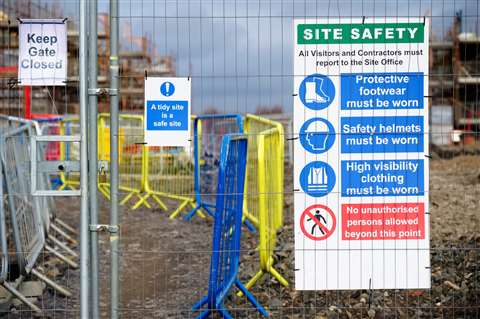What happens if construction companies breach safety regulations?
23 August 2022
Complying with EHS regulations is essential for many industries, but it’s especially important for construction businesses because of the size of the sector. Construction is estimated to generate 13% of the world’s GDP (gross domestic product), making it the world’s largest industry.
 Demolition work being carried out on a construction site. (Photo: Adobe Stock)
Demolition work being carried out on a construction site. (Photo: Adobe Stock)
Failure to comply with these regulations can have an adverse effect and could result in construction delays, financial loss, and most importantly, loss of life.
Risks to construction site safety
Due to the nature of construction work, the safety stakes are significantly higher than in most other sectors. Hazards related to working at height, unguarded machinery, proximity to heavy construction equipment or power lines, and occupational disease related to silica dust and asbestos are just some examples of risk.
Ensuring safe building practices remains one of the industry’s top priorities, yet businesses still face problems with employee engagement and compliance.
The latest Health and Safety Executive (HSE) stats for the construction industry reveal the human cost of negligence. In the United Kingdom, there were 30 fatal injuries to construction workers in 2021-22 as a result of negligence.
In fact, the UK-based body recently fined a demolition company after one of its workers fell 9.1m (30 ft) to his death when part of a pipe bridge platform gave way.
With 123 deaths from injuries in workplace incidents, the construction industry is the deadliest of all sectors in terms of fatalities and represents nearly a quarter of all reported fatalities.
The hardest part of these statistics are what comes with them. Behind every statistic is a name and a family, which means more than 150 families and friends were affected by such tragedies. These failings also lead to consequences for businesses in the UK, and those that run them.
Even one death at work is one too many. Every employee should expect to carry out their work in a safe and healthy working environment and return home just as safely.
Businesses that do not take this seriously and fail to comply can result in some serious business consequences. Here are some of the main consequences of EHS (environment, health and safety) non-compliance.
Breaches to safety regulations are a criminal offence
EHS is a legal requirement for construction businesses. Did you know that breaching health and safety regulations is a criminal offence? Businesses have a duty to ensure the working environment is safe for employees.
If a business is found to have breached regulations, then it will face consequences which can include fines and even prison sentences.
Fines will be handed out to construction companies
Failure to comply with EHS regulations such as recording, tracking and reporting guidelines will result in major fines and penalties for construction companies.
 Statistics show that construction is the sector with the most fatalaties. (Photo: Adobe Stock)
Statistics show that construction is the sector with the most fatalaties. (Photo: Adobe Stock)
According to the HSE, British businesses are fined an average of £147,000 (US$173,000) per convicted case.
Additionally, the injured employee can also claim against the business that is responsible. Issues that endanger human lives can produce unlimited fines and even imprisonment.
The most serious violations will result in civil or criminal legal proceedings against the construction company, leading to serious financial strain on top of the fines.
Prioritise worker safety
Notable safety violations and public fines won’t help current employees feel confident in the company, and can make it harder to attract and retain highly qualified employees.
If companies don’t show that they value them enough to provide even the most basic of requirements, which is a safe working environment, the result will be unengaged, unmotivated employees looking to exit the business.
Can health and safety violations impact your reputation?
Non-compliance with health and safety regulations can also hurt a business’s reputation. If violations are revealed and in the public domain, then these reported quality issues can impact the success of securing new projects.
It is not good business to partner with a company that has inefficient operations which leads to major violations and safety issues. A poor health and safety culture will cost a business its reputation.
Disqualification from construction
If a company is found to be negligent, then disqualification from the industry is a possibility. As it’s the employer’s legal responsibility to protect their employees, any disqualification or prosecution targets those at the top.
Prosecutions brought forward by the HSE in the UK have a 93% conviction success rate.
Construction: preventing accidents and injuries
Inadequate health and safety procedures can result in serious injuries or fatalities. The death of a worker is the most severe consequence. In the construction industry, the biggest priority is to prevent serious accidents and injuries as the industry continues to have one of the highest rates of work-related deaths.
With 30 deaths in the UK construction industry in 2021-22, publishing figures such as these raise awareness and should drive improvement in occupational safety and health.
STAY CONNECTED



Receive the information you need when you need it through our world-leading magazines, newsletters and daily briefings.
CONNECT WITH THE TEAM








